Welcome to the 81st
Will a new speaker and more Democrats spell 'change' at the Capitol?
Fri., Jan. 9, 2009
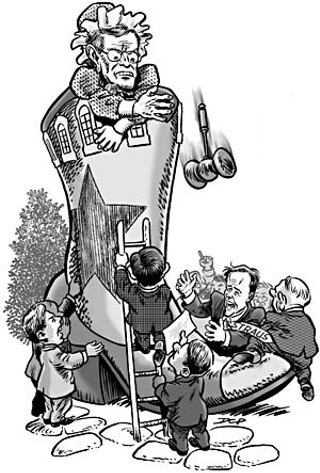
As the 81st Texas Legislature gathers for the opening gavel Jan. 13, Texans might be forgiven for presuming that the only pressing business at hand is the selection of a new speaker of the House. Contributing writer Richard Whittaker has been following the machinations on our online Newsdesk blog (austinchronicle.com/newsdesk) and has updated the action in this issue (see "Looks Like a Straus Waltz to House Speaker"). As we went to press Wednesday, it would appear that the fight is all over but the formal vote on Jan. 13, and the new speaker is relative newcomer Joe Straus, R-San Antonio. Still a Republican, still very much a Texas conservative, and if there's a lesson here from Tom Craddick's humiliation, it's an old one: Pride goeth before a fall.
As the dust settles, Straus may soon be wondering why he took the job. Until it blew up in his face at the end of last session, Craddick's approach to leadership had the virtue of simplicity: his way or the highway. While it's a given that the new Lege will be more "Democratic" than its immediate predecessors, it's still a GOP Legislature, and it will be a while before we know how that greater political balance will translate into policy. The Capitol governs from the right on public policy, with occasional nods to the center. Progressives, whatever the issue, can expect to spend much of their time playing defense.
This week, the Chronicle News staff reports on anticipated legislation, good and bad. The earliest filed bills are only the beginning of the story, but they provide a snapshot of the session's priorities: headline efforts on transportation and prisons, less attention to public schools and higher education, social services and environmental matters picking up the crumbs. The last session made such a hash of tax reform – with the ballyhooed business-franchise tax being both more complicated and less efficient than the property taxes it presumably replaced – that legislators are likely to spend much time and energy explaining to their constituents why there is just not enough money to go around.
They're used to that.
Moreover, there are two major external factors clouding the horizon. The first is the lingering and uncertain burden of the aftermath of Hurricane Ike, both a financial and political crisis. Not only will Galveston-area lawmakers expect the state to respond to the region's rebuilding needs, but the discussion will take place in the context of the University of Texas regents' decision to lay off thousands of UT Medical Branch employees – which many believe is a preliminary step toward moving the heart of state medical research facilities to Austin.
More threatening: the national economic crisis, which has begun to hit Texas in the form of growing layoffs and diminishing sales-tax revenues. Both property taxes and sales taxes are declining, and the franchise tax has already come up short at least $1 billion. In what has become a Texas biennial tradition, Gov. Rick Perry has already told state agencies to cut their proposed budgets, and that's just the tip of the iceberg. The national meltdown will be this year's ready excuse, once again, to underfund public education – and prominent legislators have already indicated they have no grand plans to address the dreaded education finance.
Perry has made skeptical noises about President-elect Obama's proposed national economic stimulus plan, but he has at least indicated he will make certain that Texas gets its fair share of federal funding. The status of that effort will be taking shape just about as the Lege's budget process really gets rolling – so it may be that the state's public schools will have to look to D.C. for any serious infrastructure funding. Since Texas, like most states, is required to maintain a "balanced budget," the likelihood of any state funding for economic revival is essentially nil.
As the House attempts to recover from its extended leadership struggle, it will presumably be a more affable – or at least less hostile – place to work for members and at least potentially a more bipartisan atmosphere for getting things accomplished. On the Senate side, the prospects of statewide elections in 2010 – anybody remember David Dewhurst? – and redistricting beyond are likely to color the internal politics and the jockeying for headlines.
Chronicle writers will be happy to take you along for the ride. – Michael King

Transportation: End of the Road for TxDOT?
"My belief is that, if the members of the Legislature stick by what they have been indicating, this will be the end of the road for the Texas Department of Transportation pushing its own political agenda." That's how Senate Transportation Committee Vice Chair Kirk Watson, D-Austin, envisions the next session. The status quo has already been broken: TxDOT and its budget black holes took a pummeling in the Sunset review process, Gov. Rick Perry's beloved Trans-Texas Corridor appears doomed, and toll roads lost their biggest legislative advocate with the retirement of Rep. Mike Krusee, R-Round Rock. The Texas Transportation Commission's independent 2030 Committee's warning that congestion and failing infrastructure require a $313 billion investment over the next 22 years raises a pressing need for a new vision. "It's time to get beyond the simple traditional idea that all we've got to do is provide for single-occupancy vehicles," said Watson, who has high hopes for the Rail Relocation and Improvement Fund. Watson and Transportation Committee Chair Sen. John Carona, R-Dallas, are looking to take advantage of federal economic stimulus funding but also want to ensure that money dedicated to transportation investment, such as the gas tax, actually makes it to transportation projects. As for restructuring TxDOT, Watson warns that reformers must be cautious that "in the zeal and zest of reining [in what] has become a rogue agency, we don't start micromanaging at the legislative level." – Richard Whittaker

Education: TAKS, Tuition, and Top 10%
For Texas universities, Sen. Judith Zaffirini, D-Laredo, chair of the Higher Education Subcommittee, has outlined five major issues: tuition deregulation and financial aid, mentoring, reforming the state's top 10% law, tuition revenue bonds, and setting up national research universities. "I want to keep top 10%, but we have to offer UT-Austin and Texas A&M some relief," Zaffirini said of the law guaranteeing the top 10% of high school students admission to the state university of their choice. The law was an attempt to ensure diversity after the Hopwood decision, but it has limited the schools' abilities to look beyond grades and test scores in admissions.
For public schools, House Public Education Chair Rob Eissler, R-the Woodlands, expects an effort to replace the Texas Assessment of Knowledge and Skills test with an end-of-course exam system, with a greater focus on readiness for postsecondary education. As always, funding will be an issue: "The districts want more help from the state. ... The state needs to take a more active role," Eissler said. He speculated that the state needs to find ways to apportion funding beyond the weighted average daily attendance system.– Lee Nichols
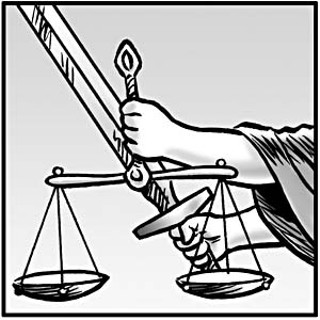
Criminal Justice: Death Never Takes a Holiday
The list of prefiled bills is already flooded with criminal justice measures, including a number of perennials. The repeat appearances include a proposal to require the Board of Pardons and Paroles to meet in person (or via telephone or videoconference, rather than not at all) to consider death cases (SB 166), a measure that would create an innocence commission to investigate and prevent wrongful convictions (SB 115), and a bill that would grant the governor power to grant multiple reprieves in capital cases (SB 169) – all filed by Sen. Rodney Ellis, D-Houston.
Ellis leads the field for criminal justice proposals; he has filed legislation that would reform the use of confidential informants (SB 260 would require CI testimony to be vetted by a judge before being presented to a jury and would require the state to provide information about a CI's background and history in working with law enforcement) and the way police agencies conduct photo and live lineups with witnesses (SB 117, which aims to reduce the incidence of mistaken identification, a major factor in cases of wrongful conviction). He wants to create an incarceration diversion program (similar to drug court) for military veterans with post-traumatic stress disorder and/or traumatic brain injury (SB 112), and he has a bill to mandate open discovery, requiring prosecutors to provide copies of offense reports and witness statements to defense attorneys in criminal cases. (Democratic Houston Rep. Harold Dutton's HB 301 is the only prefiled bill covering discovery reform, but several other similar bills are expected.) – Jordan Smith
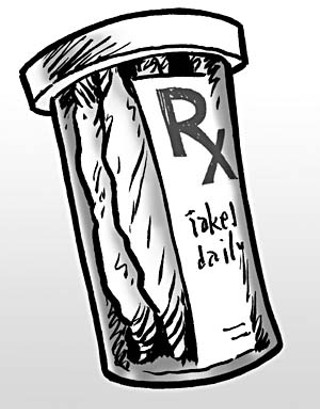
Drug Policy: Medi-Pot Gets Another Roll
In the fertile fields of "Reefer Madness," several bills have been prefiled, including Austin Rep. Elliott Naishtat's perennial medi-pot proposal that would create an affirmative defense to pot possession when the herb is recommended by a doctor for a "bona fide" illness. HB 164 would also prohibit legal targeting of doctors who recommend medical marijuana to their patients.
Competing proposals would regulate the latest demon weed, Salvia divinorum, a psychedelic member of the sage family historically grown in Oaxaca, Mexico, and long used in religious ceremonies by indigenous groups. The plant has been around and for sale on the Internet and elsewhere for years but only recently has come under the laserlike attention of lawmakers, including several in Texas. Waco GOP Rep. Charles "Doc" Anderson is proposing, again, to place salvia among the state's controlled substances and to criminalize possession. Medical researchers generally oppose that approach; the plant's active ingredient has a wide range of possible therapeutic applications – including in the treatment of depression and schizophrenia – and researchers want time to study the substance further before deciding whether, and how, the plant should be regulated. Sen. Craig Estes, R-Wichita Falls, is taking a more reasoned approach with SB 257, which would prohibit the sale of salvia to minors. – J.S.

Women's Health: Our Bodies, Our Idiot Lawmakers
One thing women's health advocates can count on: There will always be at least one prefiled abortion-related bill. This year two proposals – by repeat offenders – are already on board. Houston GOP Sen. Dan Patrick and the Chronicle's Bexar Co. favorite, Rep. Frank "the Fetus" Corte, have reintroduced legislation (SB 182/HB 36) to tweak the state's informed consent to abortion law by adding a requirement that any woman seeking an abortion first undergo an ultrasound procedure. The bill died last session but is back with a new twist: This time, instead of allowing a woman to avert her eyes, thus avoiding the ultrasound fetal image, and leaving it at that, the bill would require the doctor performing the procedure to provide narration, describing the image the doctor sees – including the "dimensions of the embryo or fetus ... and the presence of external members and internal organs." But wait, there's more! The revised bill would also require the doctor to make "audible" the fetus' heartbeat "for the pregnant woman to hear." The bill does include an exception for medical emergencies but requires the doctor to provide to the state a certified explanation of the "specific medical condition" that warranted the exception.
Corte's HB 44 – another repeat performer – would require pharmacists to tell women seeking emergency contraception (e.g., the Plan B birth-control pill) that taking the pill might prevent egg fertilization or implantation. The bill also requires pharmacies to post an 18-inch-by-24-inch sign that provides a disclaimer "in block letters" that informs customers: "IF YOU BELIEVE THAT LIFE BEGINS AT FERTILIZATION – THE POINT WHERE THE SPERM AND EGG UNITE – THEN YOU NEED TO KNOW THAT EMERGENCY CONTRACEPTION MAY EITHER FUNCTION AS A CONTRACEPTIVE ... OR PREVENT THE IMPLANTATION OF YOUR ALREADY FERTILIZED EGG IN YOUR WOMB."
No one will ever accuse the Lege's fatuous Fetus Fraternity of subtlety. – J.S.
Texas Youth Commission: Still on the Hot Seat
The Sunset Advisory Commission doesn't make its final recommendations on the future of juvenile prisons until Jan. 14, but what's pending may be this year's most important decision. Sunset staff recommend that TYC and the Texas Juvenile Probation Commission be dissolved and replaced with one new integrated agency, the Texas Juvenile Justice Department. Legislators are split. On one side is the "wait and see" crowd, such as Sen. Chuy Hinojosa, D-McAllen, who thinks that more time needs to be given to the existing reforms. On the other side are those such as Sen. John Whitmire, D-Houston, who think TYC is so structurally flawed and those flaws have weathered so many attempts at reform that starting over is the only option. Both sides are committed in principle to restructuring TYC by moving kids to smaller facilities near their homes instead of dumping them in big rural camps, but some legislators are worried about losing major (prison) employers in their districts. Either way, there will be tough questioning of TYC officials about whether they've really rooted out the endemic physical and sexual abuse. – R.W.
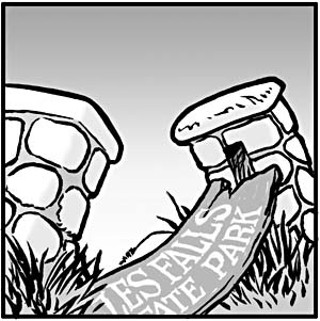
Parks & Wildlife: The Need Keeps Growing
When the Texas Parks & Wildlife Department came before the House Appropriations Committee last session, legislators squirmed in their seats as staff from the cash-strapped agency pleaded for money to buy scrapped vehicles to cannibalize to keep its broken trucks moving. After an emergency infusion of funds and a rolling reform of its accounting procedures, the agency is crossing its fingers for its 2010-2011 appropriation request – what TPWD spokesman Tom Harvey calls "our Christmas wish list." Increased law enforcement and public education roles have placed a greater financial burden on the agency, as has the fight against invasive species that threaten native plants and wildlife. Sen. Rodney Ellis, D-Houston, has prefiled Senate Joint Resolution 6, which would dedicate all sporting-goods tax revenue to TPWD and the Texas Historical Commission. Other legislators want nonhunting, recreational users to pick up more of the tab. This isn't just more cash for rural communities, Harvey explained. "Most people don't realize that most of the city parks were founded on Parks & Wildlife grants," he added. – R.W.
Business Franchise Tax: Feeding Frenzy
Since the business franchise tax was radically reformed in 2006, it's been universally condemned, with gubernatorial hopeful Sen. Kay Bailey Hutchison summing it up as "an abject failure." Somehow a seemingly modest margin tax, designed to help partially offset property-tax cuts, ended up increasing bills for many businesses and still came up $1 billion short in expected revenue. Now Sen. Eliot Shapleigh, D-El Paso, wants small businesses and start-ups exempted (SB 193 and SB 323, respectively), while Rep. Eddie Rodriguez, D-Austin, proposes tax credits for firms investing in renewable energy (HB 237). But Rep. John Zerwas, R-Richmond, went furthest, in filing the Revenue Reform Act (HB 277). It would give the state comptroller until 2010 to develop a replacement so the margin tax can be completely revoked in 2014. – R.W.
Labor: Incremental Changes
Unsurprisingly, there's no early sign of pending pro-union reforms, but there are proposals to close loopholes in employment law that leave many vulnerable Texans unprotected. San Antonio Democrats are taking the lead on workers' compensation reform. In the House, Rep. David Leibowitz, D-San Antonio, has filed a slate of laws including House Bill 35, which would require employers not covered by workers' compensation insurance to file annual accident and illness reports. Down the corridor, Sen. Leticia Van de Putte, D-San Antonio, prefiled Senate Bill 378, allowing employees making a claim to request a second medical opinion.
With the federal Unemployment Insurance Modernization Act pending, Van de Putte also has a simple but major reform prefiled to ensure compliance with the new regulations. SB 377 proposes extending unemployment insurance to part-time employees. "Many women can only work part-time because they care for their children," she said, "but in this economy, they could lose that much-needed income. We must be prepared to help."
There are also proposals to make it easier for workers who are crime victims to attend trials. SB 60 (Sen. Judith Zaffirini, D-Laredo) would give victims of physical or sexual assault time off to give testimony without fear of retribution from their employers. – R.W.
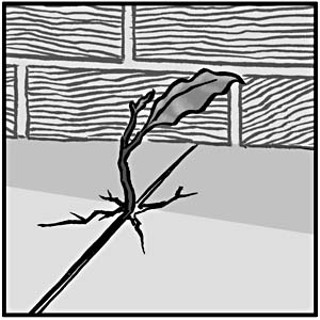
Environment/Energy: Renewing the Renewable Energy Debate
When we asked two of the state's leading environmental activists about the top green issue before the 81st Lege, "energy" was first off the lips of both the Lone Star Sierra Club's Ken Kramer and Public Citizen Texas' Tom "Smitty" Smith. Not surprising, since our state's economy revolves so strongly around energy production. More specifically, improving energy efficiency. "Environmentalists are pretty united on this," Kramer said. "We need to reduce our current power consumption." Smith agreed: "We must reduce our electric consumption because power plants are the largest single pollution sources in the state." In addition to improved efficiency, both said, promotion of renewable energy will be central to the fight. And while previous legislative efforts to up the portion of renewables in energy companies' outputs have focused on Texas' abundant wind power, Smith and Kramer said this year's focus must be on getting more out of solar.
After energy, Kramer listed increasing funding for Texas' state parks as a major priority and said enviros might also play a role in the Texas Department of Transportation's visit before the Sunset Advisory Commission, before which every state department must justify its existence. Surprisingly, Kramer said he doesn't expect water usage – an increasingly critical issue in our drought-prone state – to play a big part in the 2009-10 Legislature. Although environmentalists have long criticized state laws that allow landowners to pump as much water as they can, the effort to kill off the "right of capture" law "just doesn't have momentum yet." – L.N.

City Beat: Keeping It Realistic
"Austin supports legislation that enhances the City's ability to solve problems and improve the quality of life for our citizens," reads the city of Austin Legislative Program for the 81st Legislature. "Austin opposes legislation that reduces the City's authority, increases the City's costs, or otherwise erodes the City's ability to govern our own local affairs." The statement's matter-of-factness portends the simplicity with which the city approaches the upcoming session; instead of overreaching with an ambitious agenda – as council members feel they did two years ago – they've pared priorities down to a few they consider realistic and achievable.
Some items find the city in a defensive crouch: opposing legislation that would roll back environmental and/or water-quality protections or create caps on appraisal and revenue. There are specific areas in which the city is hoping to get some help; With the Texas Department of Transportation up for Sunset review, one is transportation and transit-related measures. The city seeks "additional funding options for city and regional transportation projects" and more specifically, $200 million for the Texas Rail Relocation and Improvement Fund. Another major priority is passage of meet-and-confer legislation for city employees, the same form of bargaining currently enjoyed by the Austin police union. Meet-and-confer legislation from Sen. Kirk Watson was unceremoniously canned at the end of last session.
The city has several smaller, specialized legislative requests, several concerned with city utilities and preserving their powers and agreements: monitoring electric utility legislation, preserving Austin Energy's Green Building and conservation programs, and seeking $300 million in biomass grant funding as well as maintaining authority over special districts in the city's extraterritorial jurisdiction with regard to water rights. Other priorities include garnering funding for health-care programs, immunizations, additional funds and resources for the Children's Health Insurance Program and Medicaid, and opposing legislation which has the city wade into "undocumented worker issues." – Wells Dunbar
Travis County: Nipping Unplanned Growth
Austin old-timers (meaning, anyone who's lived here longer than 10 years) today cringe as they drive through western Travis County and see what our population explosion has done to the once-pristine Hill Country. As each strip mall or housing development springs up, seemingly overnight, the detrimental effects of unplanned growth become glaringly more obvious. The problem is, county governments don't have nearly the kind of land-use controls that municipalities do, so there isn't a lot they can do in unincorporated areas. Austin Rep. Valinda Bolton – whose District 47 covers the southwest quarter of Travis – says she'll take another crack at changing that this session. During her freshman year two years ago, she filed a bill to strengthen county tools, but instead of going to the County Affairs Committee (on which she and fellow Austinite Elliott Naishtat sit), it was sent to Land & Resource Management and was never heard from again. Bolton expects opposition from developers and small-government advocates worried about creating greater zoning authority, but "zoning isn't at all what we're talking about," Bolton says. "We're mostly talking about the ability to plan and deal with potential incompatible use. And public-safety issues, like around transportation and water availability." – L.N.

Voter ID: A Bad Idea Returns
Republicans haven't had the issues working for them lately, so they've seized upon voter-identification laws as a possible easy score. Democrats – notably Dallas Rep. Rafael Anchia – managed to kill off major bills in the Senate last session. But the hardest part in fighting such laws is explaining why a seemingly good idea – demanding that voters provide photo identification – is actually a bad and partisan one. Citizens least likely to have photo IDs are also the most disadvantaged – women, minorities, and the elderly – and these groups are all more likely to vote Democratic. In order to stamp out the virtually nonexistent crime of voter impersonation, Dems say, thousands of Texans could be disenfranchised when they show up at the polls with insufficient formal ID. At least five voter-ID bills have been filed thus far this session, although four of them are identical. Anchia signaled he might be willing to compromise on such a law, but a new bill would need features that previous ones failed to include: provisions for saving contested votes, educating voters on their options in such situations, and closure of mail-in ballot loopholes, where voter fraud is far more likely to occur. – L.N.
Got something to say on the subject? Send a letter to the editor.










